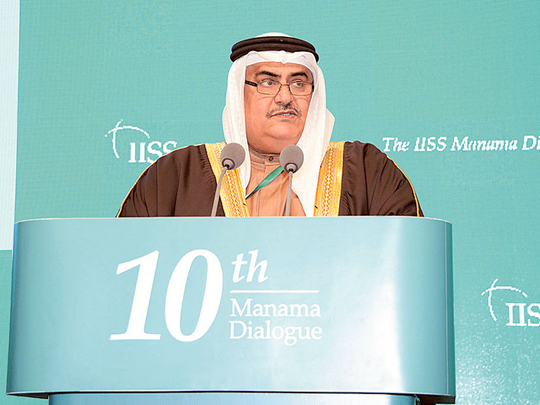
Manama: Gulf countries need to work diligently on ways to fight terrorism effectively and overcome the distrust that has hampered meaningful and mutually beneficial cooperation, Bahrain’s foreign minister has said.
“Given the proliferation of terrorist groups, we recognise there are no easy solutions, but we have no choice but to confront this problem as best as we can,” Shaikh Khalid Bin Ahmad Al Khalifa said on Saturday as he addressed the Manama Dialogue, an international conference held annually in the Bahraini capital.
“In the preceding year, terrorist groups that were once transnational entities with scattered cells have evolved into organisations that control vast territories, significant financial resources, and possess advanced weapons. However, terrorist groups such as Al Qaida and Daesh are not the only terrorist threat we face, State-sponsored terrorism is also a problem. The prime example of this is Hezbollah, a terrorist organisation that receives significant state backing and has recently expanded into Syria; another example is the creation of what amounts to a parallel standing army to that of the Syrian regime by Iran. We must not also forget that states themselves may directly be involved in terrorist activities. We see this most clearly with the terrible barrel bombing that has resulted in the deaths of literally hundreds of thousands of innocent civilians.
Shaikh Khalid said military action should not be the only line of effort in combating terrorist groups.
“Equally important is cutting off the financial lifeline that allows these groups to take advantage of physical expansion by selling oil on black markets, organising extortion rackets, looting historical artefacts and imposing heavy taxation. However, this still does not address the most important aspect of the fight against these groups.
“The terrorist groups I have mentioned rely on theocrats who distort religion to justify their crimes. Therefore, discrediting the ideology that these groups depend on and erasing their ideological appeal in the minds of youth is the central challenge we face. It is important to recognise this can only be done by the countries of the region. Only the scholars and thinkers of our region have the necessary legitimacy and influence in the eyes of our people to delegitimize these theocrats and their wicked distortions of religion,” he said.
The ideological problem can be approached through de-radicalisation, combating the sectarian division in the Middle East and making sure education is free of ideas that may promote intolerance towards other sects and religious groups, he added.
“The other major challenge we face as regional countries is the distrust that exists between regional actors, this distrust often acts as a barrier to meaningful and mutually beneficial cooperation that would otherwise be common sense,” Shaikh Khalid said.
The minister charged that some regional states harboured ambitions to dominate the entire or parts of the region and cooperated with other states only when cooperation helps them achieve their hegemonic aims.
“This leads to distrust and a lack of cooperation and information sharing between regional states that, in turn, creates an information vacuum, inevitably leading to the spread of misinformation and distrust,” he said.
Shaikh Khalid said the most pressing regional priority was for states of the region to step forward and take a leadership role in ensuring regional security.
“It is time we acknowledge only the countries of the region in partnership with our allies, can achieve lasting regional security. As regional states take the leading role in security operations, it will encourage states to work towards a common goal regardless of any differences they may have with one another. We see this clearly in the Gulf Cooperation Council (GCC). Differences arise from time to time, but we never allow those differences to interfere with the strategic objective of cooperating for joint security. In addition, through cooperation with one another, states of the region will get an opportunity to learn more about one another, about each other’s capabilities and intentions. This will reduce the chances of misperception and distrust between neighbours,” he said.











